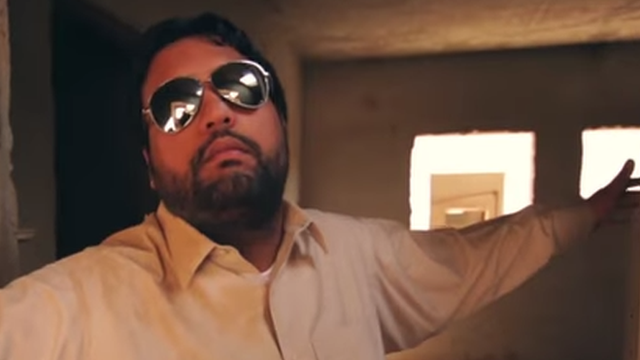'Nowhere is safe': Behind the Bangladesh blogger murders
- Published
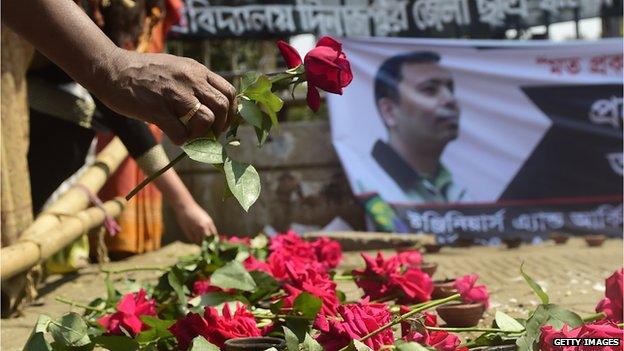
Bangladesh's small community of online atheists is in shock after the murder of another blogger. Many are focusing on one detail of the latest killing - its location.
The men who hacked Niloy Neel to death with machetes seemed to be following a gory pattern that we have already seen three times this year.
Just like Avijit Roy, Washiqur Rahman and Ananta Bijoy Das - all killed recently - the victim was known to internet users as an atheist. They form a community who, for several years, used blog posts to challenge the existence of God, and to argue with Islamic and other religious and political ideas.
Islamic extremists have been blamed by authorities for the spate of murders of atheists.
There was one crucial difference this time, however: Neel was attacked in his own home, whereas the others were attacked in public.
Last week I was in Dhaka, speaking to bloggers and Islamic groups, and broadcasting a special hour-long edition of BBC Trending on World Service radio. We met several atheist and secular bloggers who were extremely cautious in public but felt it was safe to talk to us at home - at least at that point.

Niloy Neel was an atheist from a Hindu background
The 'list'
So far, two madrassa students have been arrested for Rahman's killing, and an online Islamist who called for Roy's murder has been detained - though no one has yet been charged.
All four men killed were on a list of 84 "atheist bloggers". The list was drawn up by Islamic groups in 2013 and has been widely circulated. It was originally submitted to the government with the aim of having these bloggers arrested, and tried for blasphemy.
The large Islamic groups who initially wanted bloggers arrested told us they have no knowledge of who is killing them. Online, many pro-Islamic voices condemn the killings but also criticise secular and atheist bloggers.
"They were making fun of Allah, in a really bad way," Trivuz Alam, a conservative blogger, told BBC Trending.
Talukder Shaheb (not his real name), a young blogger associated with the Jamaat-e-Islami political party, also condemned the murders but defended those who want the bloggers arrested.
"In Bangladesh you can get arrested for criticising the prime minister," he said. "Then why not criticising God, because God is much higher than the prime minister, right?"
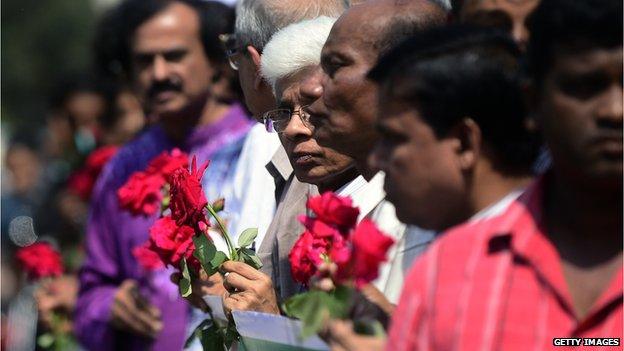
Bangladeshi social activists wait to pay their last respects to blogger Avijit Roy
The backdrop to the killings is more complex than the argument over religion alone, though. There is a political history too.
For example, Islamic groups label all these bloggers as simply "atheists" - and indeed many were. But in fact, others on the list would be better described as secular voices, not questioning religious belief but arguing against a public role for religion in Bangladesh.
What united them as bloggers was involvement in a wider, mainly secular protest movement that took to the streets in the Shahbag area of Dhaka in 2013. Among other things, they wanted the death penalty for a convicted war criminal from the Jamaat-e-Islami party.
This secular street movement was later opposed by Islamic groups, who themselves took to the streets - until the police cracked down on them.
Bloggers arrested
Bangladesh's Minister of Information, Hasanul Haq Inu, told BBC Trending that religious militants had tried to "divert the issue" - or draw attention away from themselves - by attacking the bloggers as "atheists and anti-Islam".
But two years on, after the spate of murders, many of the bloggers are now furious with the authorities.
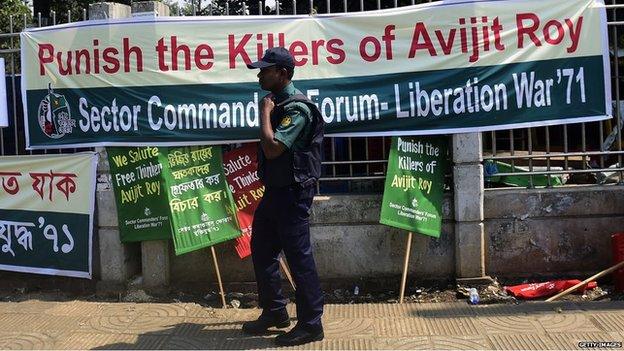
They accuse the authorities not only of failing to protect them - but of arresting atheist bloggers to appease Islamic groups.
Six have been arrested and bailed on charges of hurting religious sentiment.
Sarah Hossain, a human rights lawyer who represented several arrested bloggers, told us: "The concern that many of us have is that while you cannot hurt religious sentiment, you can hurt secular sentiment as much as you want."
The government has been accused of suppressing freedom of speech for religious and secular voices alike, including through the arrests of opposition figures.
But Mr Inu defended government actions. "We have certain laws that say you shouldn't use religion in the wrong manner," he said. "If you incite somebody or you incite disorder, then you are supposed to be arrested and face trial,"
He denied freedom of speech was under threat in Bangladesh.
"If you look at the mass media and social media, everybody is criticising the loopholes of the government or the misuse of power, or corruption," he said.
'Open prison'
The mood among atheist and secular bloggers, after the latest murder, is a mixture of fear and defiance.
"Bloggers [and] progressive-minded members of society are fuming with rage," blogger Arif Rahman tells BBC Trending. "Bloggers are no longer afraid. The anger towards the government is now the main theme."
But others seem more cautious. One tells us the whole country has become an "open prison" for him and his young family, and he has been scared into censoring some of what he writes.
This morning, he says he is even more terrified. "There isn't an inch of safe space in Bangladesh," he says. With a blogger now killed at home, he asks: "How can I think my house is safe?"
Additional reporting by Estelle Doyle
Next story: How an 'Indian worker slapped' shocked an Arab nation
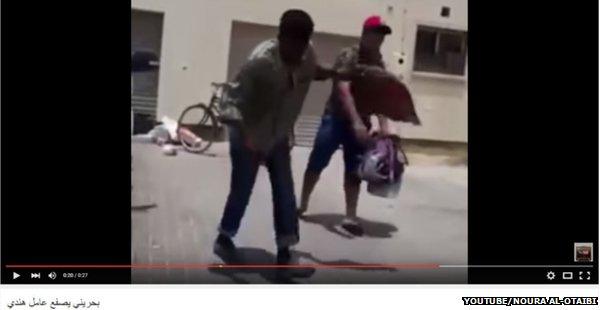
Bahrainis online have criticised the slapping of an expatriate
A video of what looks like a migrant worker being slapped in Bahrain has shocked many in the country. READ MORE
You can follow BBC Trending on Twitter @BBCtrending, external, and find us on Facebook. All our stories are at bbc.com/trending.
- Published4 March 2015
